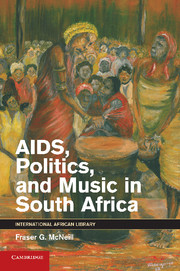Book contents
- Frontmatter
- Contents
- Maps
- Preface
- Acknowledgements
- Abbreviations
- Select Glossary of Tshivenda Terms in the Text
- Maps
- 1 Introduction
- 2 The Battle for Venda Kingship
- 3 A Rite to AIDS Education? Venda Girls’ Initiation, HIV Prevention, and the Politics of Knowledge
- 4 ‘We Want a Job in the Government’
- 5 ‘We Sing about What We Cannot Talk About’
- 6 Guitar Songs and Sexy Women
- 7 ‘Condoms Cause AIDS’
- 8 Conclusion
- Appendix A: Songs on Accompanying Web Site
- Appendix B: ‘Zwidzumbe’ (Secrets)
- Appendix C: AIDS, AIDS, AIDS
- References
- Index
2 - The Battle for Venda Kingship
Published online by Cambridge University Press: 05 November 2011
- Frontmatter
- Contents
- Maps
- Preface
- Acknowledgements
- Abbreviations
- Select Glossary of Tshivenda Terms in the Text
- Maps
- 1 Introduction
- 2 The Battle for Venda Kingship
- 3 A Rite to AIDS Education? Venda Girls’ Initiation, HIV Prevention, and the Politics of Knowledge
- 4 ‘We Want a Job in the Government’
- 5 ‘We Sing about What We Cannot Talk About’
- 6 Guitar Songs and Sexy Women
- 7 ‘Condoms Cause AIDS’
- 8 Conclusion
- Appendix A: Songs on Accompanying Web Site
- Appendix B: ‘Zwidzumbe’ (Secrets)
- Appendix C: AIDS, AIDS, AIDS
- References
- Index
Summary
This chapter examines the context of a decision taken by the post-apartheid South African government to recognise one paramount king in each of the areas with a history of traditional leadership. In Venda, this has given rise to a bitter succession struggle between the royal houses of Mphephu and Tshivhase that has reignited historically salient rivalries between the two. Notions of an African renaissance have become central to Kennedy Tshivhase's strategy for the consolidation of power, and it is this that has prompted the official promotion of tradition within his borders. I am thus concerned with the question of how far the recognition or imposition of culture by the state leads to a strengthening of traditionalist forces and visions within the local political arena (Oomen 2005: 25). In what ways has the state lent legitimacy to traditional leaders, and what have been the consequences of this ‘on the ground’? I describe in detail the role of traditional leaders in the transition from apartheid to democracy in Venda. In doing so, I analyse the political origins of an official promotion of tradition, so that in subsequent chapters I can trace the ‘folk model’ of AIDS not only to the traditional/ancestral knowledge in which it is rooted, but also to the political processes through which it is mediated.
The Politics of Tradition and the African Renaissance
The concept of tradition, and the role it plays in rural post-apartheid South Africa, is central to the way in which I analyse the dynamics of AIDS discourse in Venda. Tradition has been invoked to reclaim a perceived loss of the capacity to control healthy social reproduction in the post-apartheid era. But this has played out in an uneven and contradictory manner, pitting generations and genders against each other in the abortive attempt to resolve the supposed crisis. Contemporary concern with a pre-colonial past, epitomised in the marketing of Limpopo Province as ‘Africa's Eden’ on the road to Venda, is by no means exclusive to South Africa: it is a truly global phenomenon. The revision of ethnic essentialism to include identity politics (to paraphrase Comaroff and Comaroff [1991: 1]) has taken on a multitude of guises in recent years, from New Zealand to Newfoundland, Amazonia to Australia. A ‘growing traditionalism’ (Fuller 2003: 153) can be both helped and hindered by the potent forces of the state, and can involve the selective reclamation of older legitimating symbols as hedges against new symbolic orders (ibid.: 160). Vast numbers of people in post-apartheid South Africa are actively engaged, apparently independently of state policy, in processes that they consider to be part of a traditional, ‘tribal’ repertoire that is legitimate precisely because it is ‘of the past’.
- Type
- Chapter
- Information
- AIDS, Politics, and Music in South Africa , pp. 26 - 73Publisher: Cambridge University PressPrint publication year: 2011



